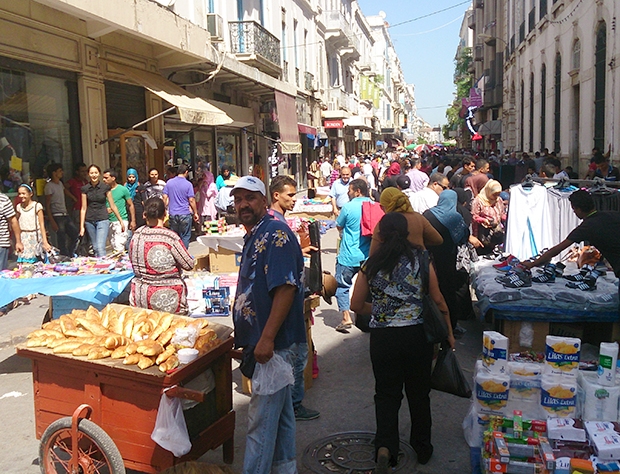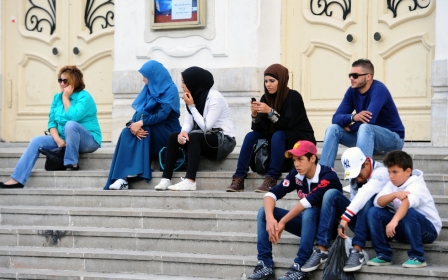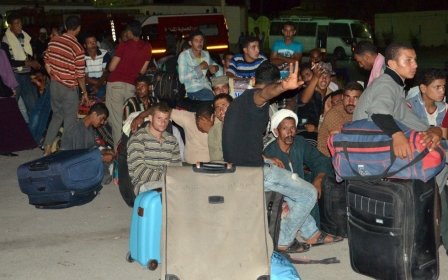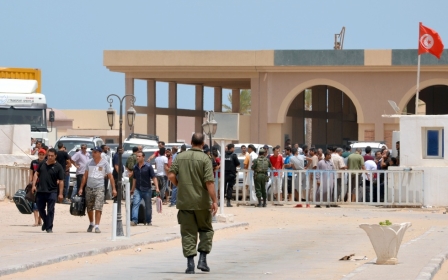Illegal street vendors struggle for survival in post-revolution Tunisia

Haythem Charfoui has been working as a street vendor in downtown Tunis for 12 years, playing what he calls a “cat and mouse game” with the police.
“The authorities come, take your goods, hold you for three days in Bouchoucha [detention center],” Charfoui, 29, told Middle East Eye. “We have grown accustomed to them.”
Charfoui is one of the hundreds of street vendors that can be found every day around the central market in downtown Tunis. They sell everything from toys to towels to appliances, often at bargain prices, and the streets are full of shoppers eyeing their wares. They all, however, work illegally.
Their numbers have increased dramatically since the 2011 revolution, with a stagnant economy bringing hundreds from around the country to the streets of Tunis.
Street vendors are the most visible aspect of a large, untaxed informal economy operating in Tunisia. The World Bank estimated last year that Tunisia loses 1.2 billion dinars ($700 million) of public revenue annually from goods traded illegally.
Their merchandise is often displayed on tarps atop crude tables constructed from cardboard boxes. When a police vehicle is spotted, word spreads quickly and the vendors gather their wares and run.
“When they come, we flee, when they go, we come back and work,” Charfoui, who sells bath towels, told Middle East Eye, while resting in the shade on a hot August day. Vendors will often return within 30 minutes of a raid.
Many of the goods that make their way to the streets of Tunis are produced abroad and then smuggled into the country. Items produced in China and Turkey are shipped to Libyan ports, for example, then taken through the border crossing into the town of Ben Guerdane in Tunisia. This allows traders to avoid steep tariffs in Tunisia. Customs duties for goods coming in from China average six percent in Libya, but 33 percent in Tunisia, according to a 2013 World Bank report.
Similarly, prices of certain goods in Tunisia may be several times greater than in the Algerian market, meaning smugglers have an incentive to move items including cigarettes, coffee, and televisions over Tunisia’s porous western border.
The vendors say they would do other work if they could, but with the national unemployment rate over 15 percent and significantly higher in many inland communities, the informal economy may provide the only means for many to make a living wage.
Vendors operating in the Tunisian capital tend to come from the country’s poor interior regions. Charfoui is from Jendouba, in northwestern Tunisia, and said that vendors from the same town tend to stick together and stake out territory in Tunis, claiming a strip of pavement as their own.
Despite the insecurity and the threat of jail, vendors said that this is the only option they have to survive.
“What’s better? To work for yourself or to steal?” asked Mohamed Ben Jemaa Ouichawi. “Go and linger in coffee shops, harass people’s daughters, and go smoke weed and use drugs?”
Ouichawi, a middle-aged man, sells a variety of pocket-sized consumer goods in a crowded square near Place Barcelone in downtown Tunis. Lighters, tape, knives, and other items go for extremely low prices. A sharp kitchen knife is about 14 US cents, a pack of AA batteries around 30.
“Where would all of these people go? They all have families, they all have kids, whoever comes to work here has conditions only God knows about,” he told Middle East Eye. His own mother is sick and his father is dead. After two surgeries, he is unable to do manual labour and finds street vending the only way to support his family.
Malika Saidi, a 34-year old mother of three, is one of the few women working as street vendors in Tunis. Her husband is sick, she said, and this is the only option she has to make money.
Chaher is just 16, and works beside children even younger. He comes from Kasserine, in western Tunisia, and said he works as a vendor in Tunis during the summer. The scarves he sells come from a brother who travels to Algeria and Turkey to buy goods.
“Our problem in this work is the municipal government,” he told Middle East Eye. “We want them to let us work. [The authorities] confiscate the goods and they do not give them back unless you give a bribe.”
Ten dinars is enough for the police to leave you alone, he said. Other vendors also stated that police looked for bribes.
Mokded Trabelsi, a representative of the Municipal Police Service in Tunis, strongly denies this.
“It's all rumor. No one has ever come to us complaining,” he said. “But if there are [bribes] the administration would take the necessary legal measures against [the officer receiving a bribe].”
Trabelsi said the street vendor problem has been as issue for decades and is now growing. It is difficult to tackle because there are so many people involved. Even if a few are arrested, business will continue largely unchanged.
“Cousins come from back home,” to replace an arrested vendor, he told Middle East Eye. “There are 1,000. Five or ten are caught and the rest escape.”
Cell phones have made it even harder to conduct raids, as word travels almost immediately that the police are on the way.
“Sometimes you carry out an operation, and there is no one there,” Trabelsi said.
Marwen Kamoun runs a menswear shop in downtown Tunis. He said that legal businesses are greatly harmed by the street vendors displaying their merchandise just outside their stores. The vendors are trouble, he added, harassing and driving away female customers, leaving trash in the streets, and fighting amongst each other.
“Street vendors are hampering work and do not let people shop comfortably,” Kamoun told Middle East Eye.
The last fight Kamoun saw led to a car being damaged and a shop window being smashed. He sees such incidents of violence as a good reason to call the authorities on the vendors, but complains that police usually show up too late.
“Ben Ali’s era was better,” Kamoun said, referring to the former president who fled during the 2011 uprising against his rule. Before the revolution, vendors had to rent a space from the municipality and could only sell products different from those at nearby shops.
Kamoun said the solution now is for shopkeepers to band together and carry out strikes to protest the situation.
Fakher Masoudi, 21, comes from the town of Sbiba in western Tunisia. He dropped out of school when he was young and works with several other vendors selling dresses and scarves.
Masoudi said he used to work near the Algerian and Libyan borders, but the risk of having goods confiscated during cross-border trade has increased since the revolution. These new dangers are leading more people to deal with Tunisian-made products, he added.
Wherever the goods may come from, the vendors who sell them work long hours in the intense North African sun, and may long for an easier life.
“Those who work like this have responsibilities,” Mohamed Ben Jemaa Ouichawi said. “When I see my peers dressed up, having fun, and going to the beach, it saddens me. But life without problems is not enjoyable.”
Middle East Eye propose une couverture et une analyse indépendantes et incomparables du Moyen-Orient, de l’Afrique du Nord et d’autres régions du monde. Pour en savoir plus sur la reprise de ce contenu et les frais qui s’appliquent, veuillez remplir ce formulaire [en anglais]. Pour en savoir plus sur MEE, cliquez ici [en anglais].





